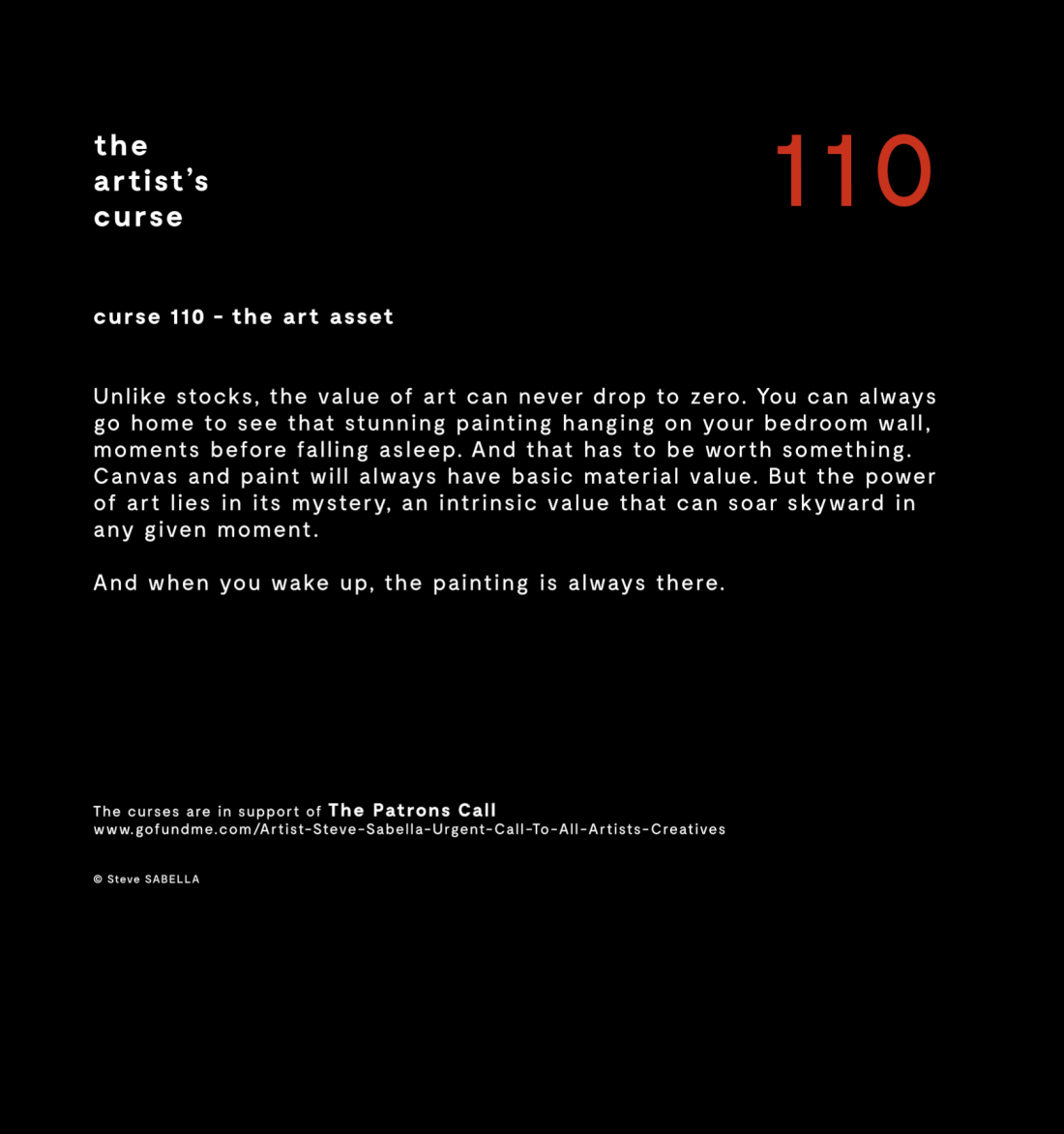A profile of David Gleeson’s 2003 comedy-drama. Contains some spoilers.
Set in Limerick city during the boom years, Cowboys and Angels depicts the growing friendship between two very different men and looks at the anxieties and challenges faced by young people trying to establish their identity in a modern city. When shy civil servant Shane (Michael Legge) ends up sharing a flat with gay fashion student Vincent (Allen Leech) he finds himself thrust into the excitement and confusion of city life. With Vincent’s help, the hapless, insecure Shane attempts to change his image and win the affections of love-interest Gemma (Amy Shiels). However Shane’s life starts to spiral out of control when finds himself swept up in a world of drugs and criminality putting his relationships with everyone around him at risk.
“Have you ever felt that life was passing you by? Did you ever feel like there was something missing? If you knew what that something was would you know where to look for it? Would you even know where to begin?” Shane in Cowboys and Angels (2003)
David Gleeson’s 2003 film Cowboys and Angels follows two young men living in early noughties Limerick city. The film was something of a passion project for director and screenwriter Gleeson who spent seven years developing the project. At first glance the film’s premise could belong in any number of generic odd-couple films; two very different twenty-something men end up sharing an apartment and after a series of trials and misunderstanding end up forming a deep friendship. Upon its release the film drew the attention of critics for its depiction of modern urban Ireland, with the setting of the film being shown as a thriving university city with a youthful population and a lively nightlife. Writing for Variety Robert Koehler stated that “although its premise of a young man venturing on his own in the big city is nothing new, writer/director David Gleeson’s Cowboys and Angels focuses the familiar idea on hipster 21st century Ireland”. To audiences nowadays Gleeson’s comedy-drama acts as a snapshot of an early noughties Ireland where the Celtic Tiger was in full swing and the country began to re-brand itself as modern, urban and cool. Reviews of the film frequently dwelt on this sense of its ‘coolness’ with Tanya Warren describing it as being “one of the hippest films made in Ireland of late.” Although the visual aesthetic of the film appears dated to present-day viewers, (the fashion featured in the film is glaringly noughties, with Vincent’s spiked blonde hair and technicolor wardrobe in particular standing out) the costume and production design was carefully chosen to reflect all that was stylish and on-trend at the time.
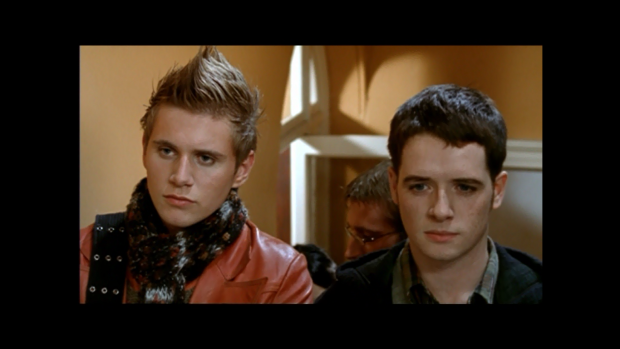
Allen Leech and Michael Legge as Vincent and Shane in Cowboys and Angels (2003)
In a previous article entitled “Beyond ‘Hip hedonism’: the darker side of urban Celtic Tiger Ireland” I explored how the film portrayed the dark heart beneath the bright glossiness of the world of the film. While the city portrayed in the film is shown to be a hub of sexual freedom and youthful energy, there is also an murky undercurrent of criminality and violence present in the world of the film.
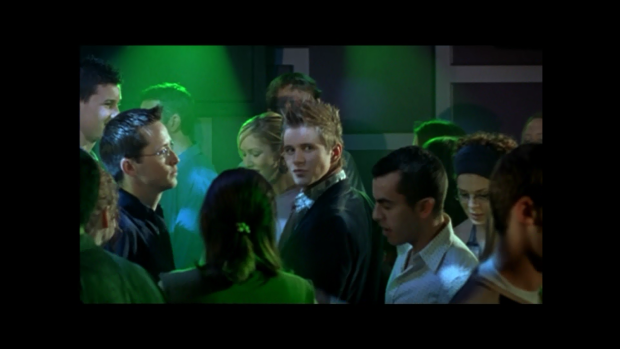
Cowboys and Angels (2003)
Gleeson’s film also stands out for its exploration of the challenges and anxieties felt by the young people who inhabit the city. The three central characters all appear to suffer from a sense of aimlessness and entrapment. Shane is trapped in a tedious office job where he is surrounded by much older colleagues. After returning from America college dropout Gemma finds herself back living with her parents and working in a local fast-food restaurant. Even the confident and focused Vincent struggles under the pressure of course work and is anxious about life after college. Although this modern Ireland appears to have a lot to offer a confident, stylish young man, Vincent still dreams of escaping to New York. At times during the film all three characters appear struck by a lack direction or a clear view of the future. The strain of financial worries also plays a key role in the film. After his fathers death Shane was unable to afford to go college and had been obliged to continue to live at home with his widowed mother. After deciding to move out Shane struggles to find a place to live, something that has relevance to today’s viewers given the current housing crisis, and in the opening scenes he views a series of grim rental properties. Shane’s financial woes also lead him into criminal behaviour with his desperation to afford flashy clothes and college fees pushing him to work for drug dealer Keith.
“Jesus Christ! How long have you been away from home? Weeks? You turn into f**king Scarface.” Vincent in Cowboys and Angels (2003)
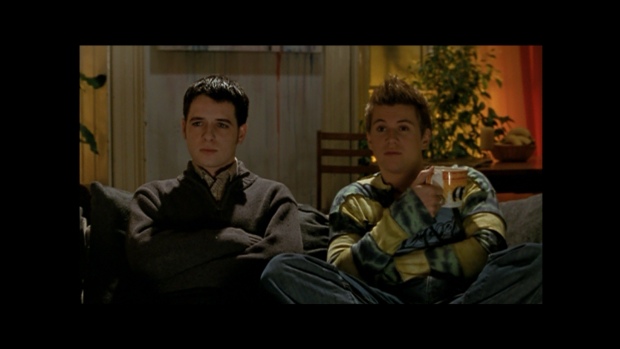 Cowboys and Angels (2003)
Cowboys and Angels (2003)
The film boasts impressive performances from a promising young cast. Prior to Cowboys and Angels Michael Legge had starred in Alan Parker’s 1999 adaptation of Angela’s Ashes. Throughout the last decade he has continued to star in numerous film and television productions and regularly appears of stage in both Ireland and London. Most recently he starred in the hit Irish comedy The Stag (2013) alongside Andrew Scott, Peter McDonald and Amy Huberman. Allen Leech was still a student at Trinity when he was cast in the film and the following year he starred in another Irish production Man About Dog (2004). After supporting roles in television shows like The Tudors and HBO’s Rome, Leech was cast as Tom Branson in the hit ITV period drama Downton Abbey. Amy Shiels went on to have a recurring role in the Irish crime drama Love/Hate and was recently cast in the 2017 revival of the cult American television series Twin Peaks.
Legge’s performance as Shane is central to the film and his ability to capture the crippling fear and anxiety in his character was noted by critics like Robert Koehler who stated that; “The dark-eyed Legge interprets Shane with an alive, moment-to-moment sense of wonder, nausea and even terror.” Although Gemma is slightly underwritten as a character, Shiels performance manages to show real emotional dept. The film also features strong supporting performances including David Murray as Keith, a drug dealer struggling with his sexuality. The chemistry between Legge and Leech is one of the films main strengths, with the conversations between them making for some of the best scenes in the film. When looking at the character of Vincent film commentators have often dwelt on the character’s sexuality and in doing so have trivialised the character’s role. In focusing on how Vincent gives into certain stereotypes of gay characters, with his flair for fashion and slightly camp characteristics, critics have overlooked the character’s emotional complexity. Given that the friendship between Shane and Vincent is at the core of the film, critics have diminished this relationship by suggesting that Vincent merely acts as a ‘queer eye for the straight guy’ for Shane, and in doing so ignore how the friendship benefits both characters and contributes to both of their emotional journeys.
“Did you ever get scared that something terrible was going to happen unless you did something.” Shane in Cowboys and Angels (2003)
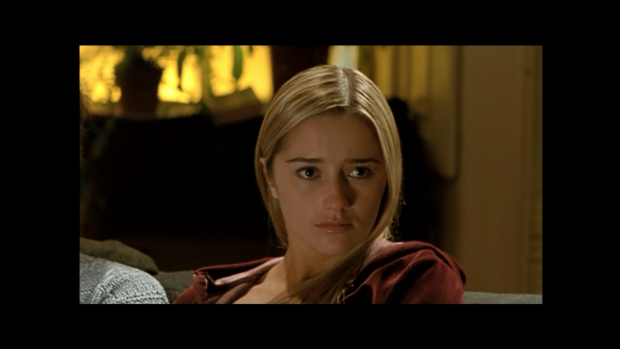
Amy Shiels as Gemma in Cowboys and Angels (2003)
“Births, marriages, engagements, retirements. If I’d a pound for every pint I pissed into the Shannon I’d have retired years ago” Jerry in Cowboys and Angels (2003)
Some of the film’s most compelling scenes come courtesy of Frank Kelly’s performance as Jerry, an older friend and work colleague of Shane’s. The character of Jerry acts as a sort of ghost of the future for Shane, someone who is filled with regret over missed opportunity. Encouraging Shane to strive for more, Jerry shows his young friend the regret and frustration that can result from settling for life in a dead end job. Jerry’s sudden death on the night of his retirement party devastates Shane, leaving him lost and even more isolated.
“In the fifties getting a job in the civil service was like winning the lottery. A secure job for life… Choice? There was no choice. I just took the job and that was the end of it… I was afraid son, it’s as simple as that. I hadn’t the balls to do anything different.” Jerry in Cowboys and Angels (2003)
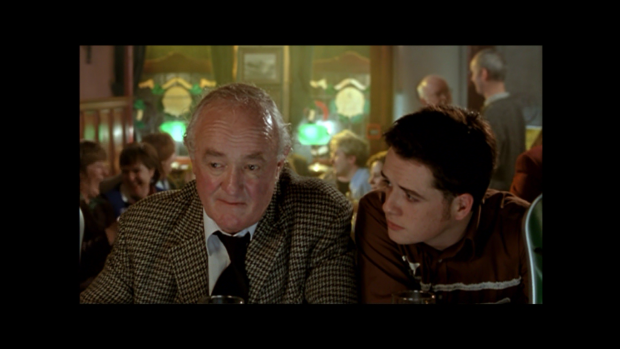
Frank Kelly as Jerry in Cowboys and Angels (2003)
Viewing David Gleeson’s Cowboys and Angels can give modern audiences a glimpse of the style and sensibility of Celtic Tiger era urban Ireland. However the film’s real strength lies its portrayal of the isolation and anxieties faced by young people lost in a modern city. At it’s core the film explores the transformative power of friendship and the ability of characters to take control of their own lives. The film is particularly impressive for touching on issues such as social exclusion, masculinity, identity and emigration, themes that would become particularly prevalent in Irish cinema in the aftermath of the economic downturn.
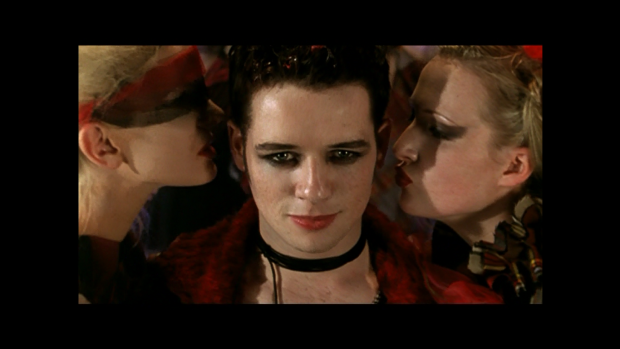
Cowboys and Angels (2003)
Works Cited
Gleeson, David, director. Cowboys and Angels. Wide Eye Films, 2003.
Koehler, Robert. “Cowboys and Angels.” Variety, 13 July 2014. http://variety.com/2004/film/markets-festivals/cowboys-angels-1117924383/. Accessed 16 October 2017.
Warren, Tanya. “‘Cowboys & Angels’ Released This Week.” Irish Film and Television Network, 22 July 2004. http://www.iftn.ie/news/?act1=record&only=1&aid=73&rid=682&tpl=archnews&force=1. Accessed October 2017.
Credit for cover photo to cineplex.com.
Advertisements Share this:




